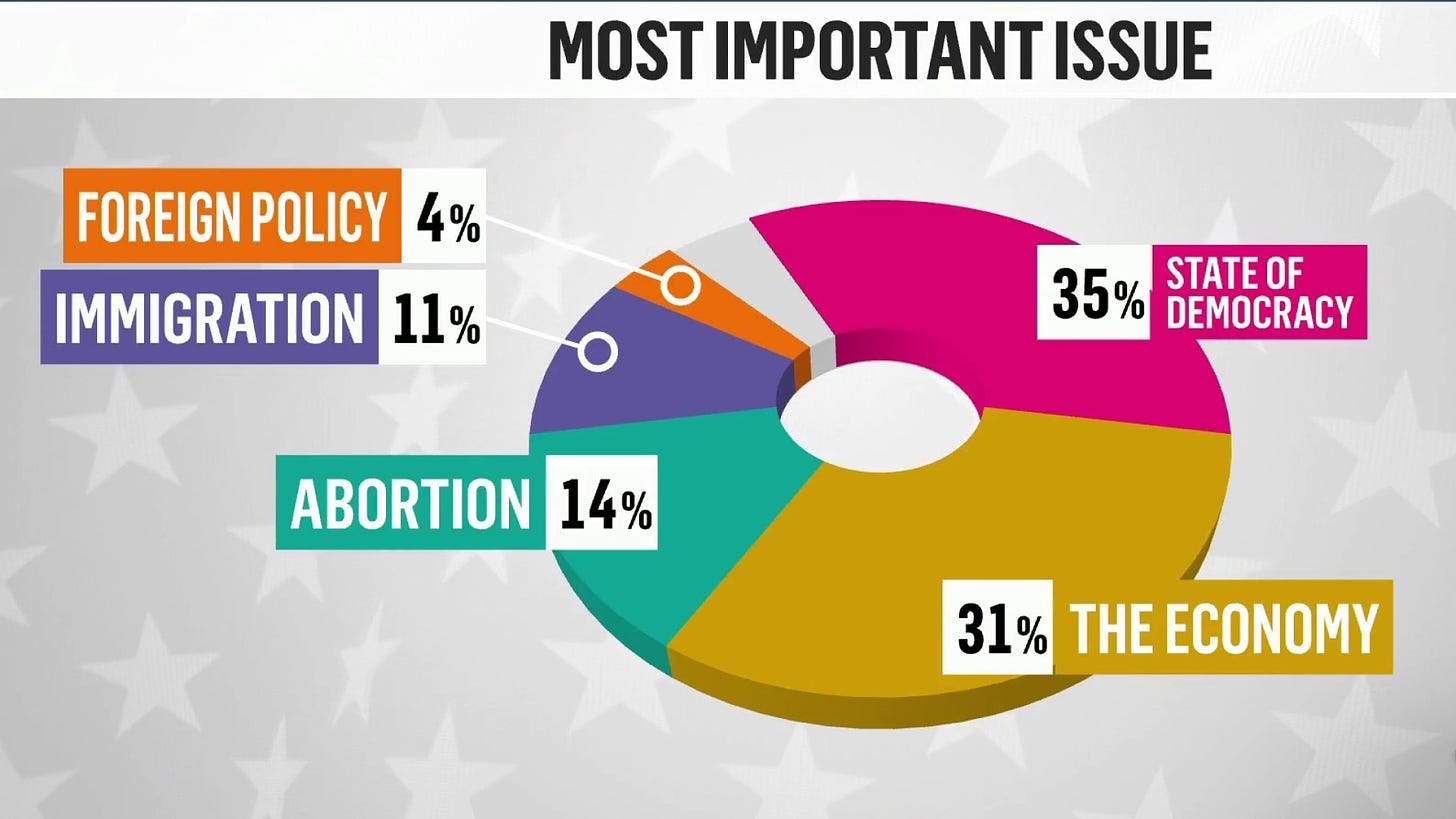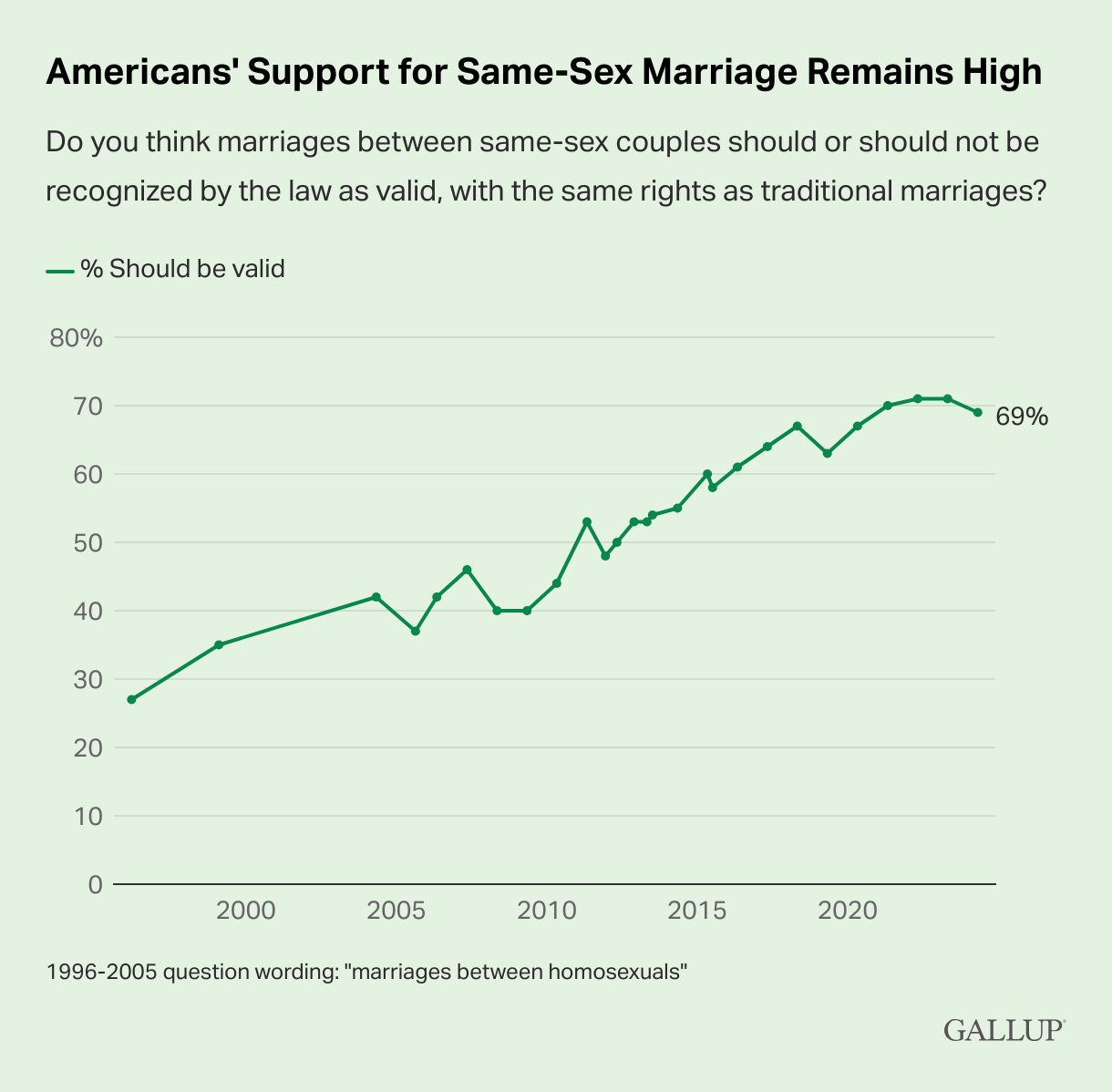14 Reasons Why Trans Rights Shouldn't Be Blamed For Kamala Harris's Election Loss
A Comprehensive Data-informed Report.
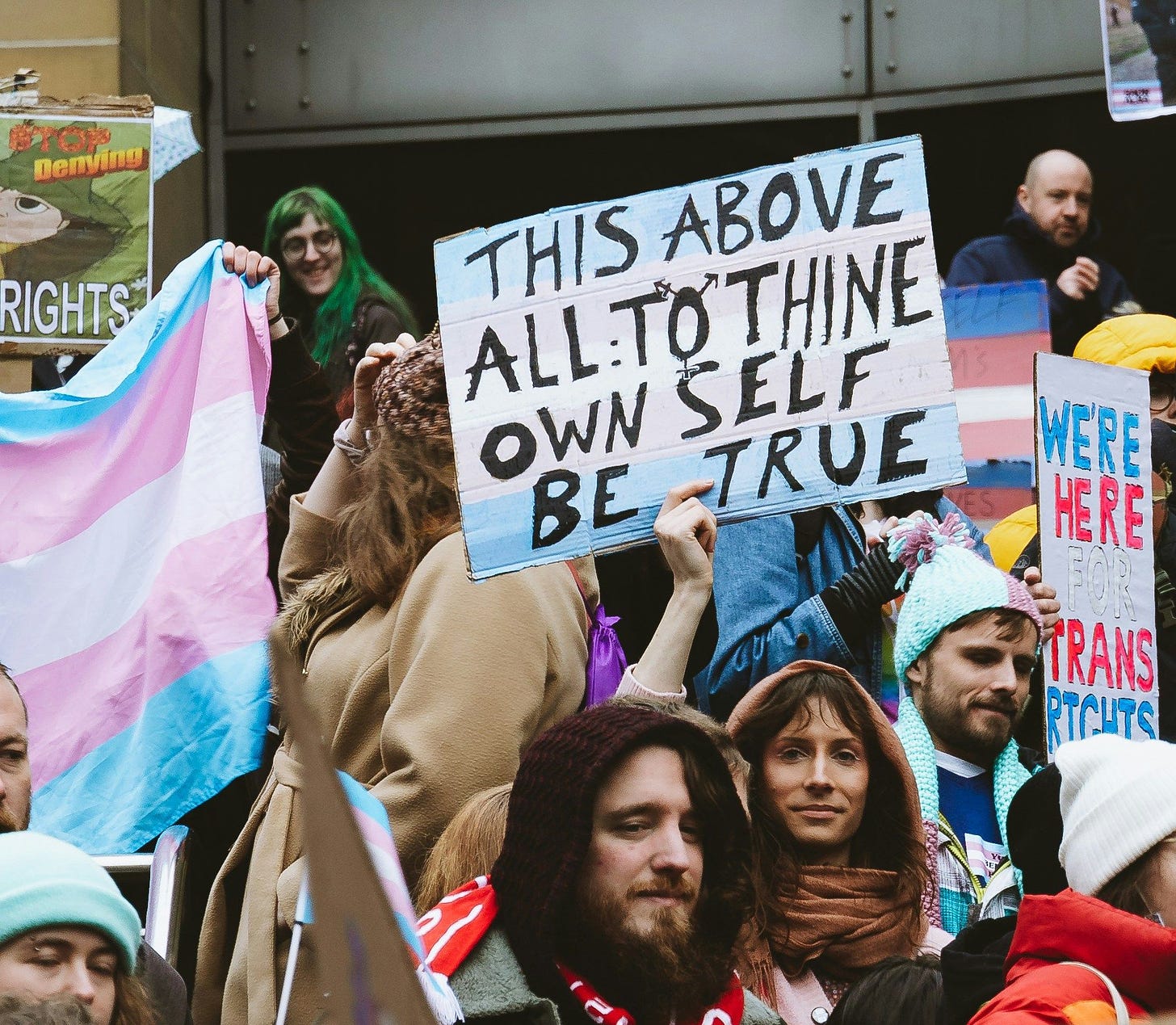
Some Democrats and mainstream voices have been suggesting in recent weeks that the party should move away from trans rights due to the outcome of the election, implying that the party would have fared better if they agreed with the GOP on certain issues of trans rights. Sweeping claims like these should require a high bar of evidence before politicians, members of the media, and general public accept it as truth. However, I have found that it’s difficult to find solid evidence to support this claim, but quite easy to find evidence that seems to oppose it. In this article, I hope to compile all of the evidence on this issue accompanied with balanced analysis and interpretation to try help the country better understand the true impact trans rights had on the 2024 election.
Although I have a personal bias when analyzing this topic as a trans person myself, I take steps to mitigate this bias by examining and analyzing all of the data available, including data unfavorable to my argument. I hope to analyze the full range of possibilities of the impact trans rights had on the election—including the scenarios where any assumptions I make throughout this article are incorrect.
The result of these efforts is the most thorough and comprehensive report anyone has written so far examining the full impact of trans rights on the 2024 election. Based on this analysis, I believe that any neutral and objective analysis of the sum of all of the data available would show that the overall impact Democrats’ support for trans rights had on the 2024 election was net positive or at least neutral, even in the worst case. By examining this issue from all possible angles and lenses, I hope to settle this debate among Democratic commentators, analysts, and politicians and move us towards a better-informed path for the country going forwards.
This report is a long read, so if you want to skip to the conclusions click here!
In order to support my goals of better informing the public, I am publishing this article under a Creative Commons license, meaning anyone can use or remix any part of this article when accompanied with attribution to the author, including for commercial use. If you appreciate my work, please subscribe and share with your friends! Follow me on BlueSky here.
1. Democrats may have lost more than they gained had they not supported trans rights.

The easiest and simplest reason why Democrats can’t blame their support for trans rights for their loss is because there’s no reason to believe taking anti-trans positions would have net-benefited them electorally. Any analysis on the impact of trans rights on the ability of Democrats to win elections must consider how that position both helps and hurts the party electorally. As I discussed in my previous article on this topic, LGBT people moved Kamala Harris (and Democrats in general) 6 points to the left in the 2024 election, as 86% of LGBT people voted for the party this cycle (the highest percentage ever). This translates to 14% of all Democratic voters identifying as LGBT—comparable to the 22% of Democratic voters who are Black.
It’s difficult to make the case that Democrats can make up for losses in the LGBT community with gains elsewhere as well, since even just a 20% reduction in LGBT support (similar to 2020) would result in as many as 1.5 millions votes for Democrats lost in the popular vote (around 1% of the roughly 150 million people who vote). Considering how Kamala Harris only won 5% of GOP voters despite moving to the right on immigration and other issues, it seems unlikely that shifting to the right on LGBT rights would result in enough of a benefit to cancel out the loss in LGBT turnout for the party.
Voter turnout is a function of how much a voter group truly believes that a party will improve their lives. Many LGBT voters actually had a lot of reason (until very recently) to believe that Democrats would support expanding LGBT rights in the face of longstanding GOP opposition. It’s important for our analysis to understand exactly why LGBT voters shifted towards Kamala Harris this election, which will be explored further in the next section.
2. Joe Biden’s progressive record and open support for LGBT rights contributed to electoral gains for Democrats.

Many exit polls and articles have lamented the fact that the electorate broadly moved towards Trump in almost every key demographic this year. However, there is one very notable exception: LGBT people. Kamala Harris gained 22 points among LGBT people in 2024 compared to Biden in 2020, which translates to an overall shift of 1.7% in popular vote since 2020.
One significant factor for this shift is the GOP’s moral panic against trans people over the last few years, which has contributed to a country where 72% of LGBT people say that the political climate negatively affects them. But another important factor is that LGBT voters trusted the Democratic party to stand up to the GOP to protect their rights, and the community rewarded them for these efforts electorally. Despite many of misgivings the queer community has with the Biden administration on non-LGBT political issues, the administration has nonetheless undeniably been the most pro-LGBT administration in modern times. I can personally attest to how Biden’s administration materially improved some aspects of my own life. Here’s a few examples:
Gender markers: Passport gender markers can be changed freely without a court order or waiting period. This policy is especially impactful in Biden’s lame-duck session as many trans people rush to update their paperwork in the face of a Trump administration. Under previous policies, it likely would have been impossible for many to update their gender marker on federal documents in just two months.
FDA regulations: The FDA no longer bars people from donating blood based on who they have sex with. This is a huge win for destigmatizing LGBT people, as well as an important step in safely improving the stockpiles of life-saving blood donations available across the country.
HIV/AIDS research, medication and healthcare access: Biden administration programs for HIV/AIDS have allowed many LGBT Americans to access PreP at no cost, and also have piloted programs that send at-home HIV tests to people who may not be able to get a traditional blood test, such as LGBT people of color without health insurance.
Gay marriage: Biden advocated for and signed the Respect for Marriage Act in 2022, which codifies much of Obergefell into federal law to protect the validity of existing marriages across the country.
Anti-discrimination protections: LGBT people have been able to apply for and work in federal government jobs with legal protections against discrimination. Biden’s EEOC has also clarified that trans people are protected by civil rights protections against discrimination at the workplace.
All of these policies were genuinely positive, popular, and largely unobjectionable progressive policies that meaningfully improved the lives of LGBT people, who no doubt have noticed the support from Democrats for their civil rights and rewarded them at the ballot box this year. Any erosion or backsliding of these policies would likewise result in LGBT people voting at lower rates and negatively impact the electoral chances of Democrats in the future.
3. Senate Democrats who experimented with opposing trans rights in 2024 under-performed compared to the same elections in 2018. Senate Democrats who continued to support trans rights won four state-wide races in states Kamala Harris lost.
Some Democrats running for Senate in 2024 have already test-run what the electoral benefit of taking some anti-trans positions would look like at the ballot box. Sherrod Brown and Collin Allred both called trans girls “biological boys” in their counter-messaging to anti-trans attack ads, and both performed significantly worse than Democrats in the same elections in 2018. Former Rep. Beto O’Rourke, who has unapologetically supported trans rights for years, came within 2.5% of upsetting Ted Cruz in 2018—one of the best performances for Democrats in a state-wide race in Texas in decades. Collin Allred lost by 8.6 points—over 3 times the margin of the candidate who did support trans rights in 2018. Sen. Sherrod Brown of Ohio, who easily held onto his seat in 2018 despite holding pro-LGBT views, actually lost to Bernie Moreno by a larger margin than Beto O’Rourke’s loss to Ted Cruz in 2018!
On the flip side, each one of Sen. Tammy Baldwin, Rep. Elissa Slotkin, Sen. Jackie Rosen, and Sen. Ruben Gallego never backed down for their support of trans rights in their Senatorial elections, despite facing anti-trans attack ads targeting their seat. And each one of them won their election despite the fact Kamala Harris lost their states! Although it’s unlikely that Allred and Brown would have won their respective Senate races had they continued to support trans rights, it seems clear that the strategy of opposing trans rights did not turn the tides in their favor either.
Part of this might be that even if some voters could be persuaded by a candidate who opposes trans rights, the fact that Democrats have supported trans rights for so long would make them unlikely to believe a Democrat who suddenly opposes them is serious about their position. In other words, a Democrat who comes out against trans rights is likely to lose votes and turnout among LGBT people, while being highly unlikely to flip many voters from the other side. This same dynamic explains why Democrats failed to persuade vast majority of voters who were upset by immigration to vote for them this year, despite the fact that the party and Kamala Harris had moved to the right on that issue.
4. No polling found that opposition to trans rights was among the any of the top issues that motivated people to vote.
One very significant piece of data that seems to have been ignored in public discussion of this topic is that not a single exit poll that asks voters what drives people to vote would suggest that a significant number of people made their decision based on opposition to trans rights. Most exit polls look something like this NBC exit poll:
Trans rights being unimportant to most voters makes intuitive sense because trans rights do not negatively impact the lives of most people, including those who oppose them. All of the impactful pro-LGBT policies I mentioned Biden enacting in section 2 of this article do not hurt anyone, which is why even right wing media outlets and influencers never actually criticized these policies. Even if voters oppose some questions about trans rights in polls, the vast majority of voters—including swing voters—weigh their positions on issues like democracy, abortion rights, or immigration more than their positions on trans rights when deciding their vote. Outside of people who are already on the far-right and will never vote for Democrats, very few people actually see trans people as an actual threat to their lives or families.
Don’t just take it from me—Brandon Rottinghaus, a political science professor at the University of Houston, told the Chron before the election that most voters, even in a conservative state like Texas, care more about issues like the economy and inflation.
“The larger issues and the more fundamental dynamics of the economy are more likely to be the driving force of who wins. Typically [while polling] we'll ask people what the most important issue in the country is…. Generally, [trans rights] don't appear in the top 10 for most voters.”
The Democratic polling firm GQR has similarly cautioned against blaming trans rights for the election in a memo released November 6th, as their data also showed the vapid unimportance of trans issues to regular voters:
“And yet, when asked their most important issues in this election, just 4 percent — dead last on this list — identify opposing transgender surgeries and transgender kids in sports as something that drove their vote.”
In other words, cultural “wedge” issues that target small groups of people continue to be insignificant compared to more salient issues that (are at at least perceived to) actually impact the average voter. Despite the hundreds of millions of dollars spent on anti-trans attack ads, the vast majority of voters still told us that they care far more about issues that more directly impact their daily lives.
5. Democratic policy positions are nearly universally more popular than Republican ones, but they still lost the election.
One simple logical flaw behind the idea that Democrats lost due to support of trans rights is the fact that the vast majority of policy positions held by Democrats are already far more popular than the equivalent GOP positions.
Whether it’s abortion, raising the minimum wage and protecting labor rights, protecting the environment and fighting climate change, or regulating and breaking up large companies, Democrats don’t appear to have a systemic issue in supporting popular policy ideas.
And we don’t just see this in polls—ballot measures that legalize abortion, increase the minimum wage, protect union rights, or mandate paid sick leave regularly receive over 50% of votes in almost every conservative state that proposes them.
What this apparent contradiction tells us is that Democrats don’t lose elections because their policies are unpopular. Democrats lose elections because Democrats are unpopular. We see this play out in the fact that the number of people identifying as a Democrat reached new lows in 2024, while Joe Biden’s approval rating sits at just 38%—about the same as Donald Trump’s approval rating at the end of his first term.
While most voters support the policies that Democrats propose, many of them are either not aware that Democrats support those policies, or do not trust Democrats will actually follow through and enact them. Either one of these causes would point towards more fundamental issues with the brand of the party that can’t be resolved by simply changing policy stances on cultural wedge issues.
6. Democrats running for Congress held the exact same positions in 2018, 2020, and 2022 and still won or outperformed expectations in all three elections.
2024 was not the first election where the GOP poured millions of dollars into anti-trans attack ads in a general election in order to make gains with voters. In 2022, voters decisively rejected this message by giving Biden’s party its strongest performance in an incumbent midterm in decades.
In previous cycles such as 2020 and 2018, Republicans hardly attacked trans rights at all, and Democrats openly supported them with no electoral consequences whatsoever. In fact, as I mentioned earlier, Trump’s attacks on transgender military members likely harmed him in the 2018 midterms, as he was perceived as persecuting a marginalized group by many voters.
7. Twitter is not real life. Twitter is not even real humans.
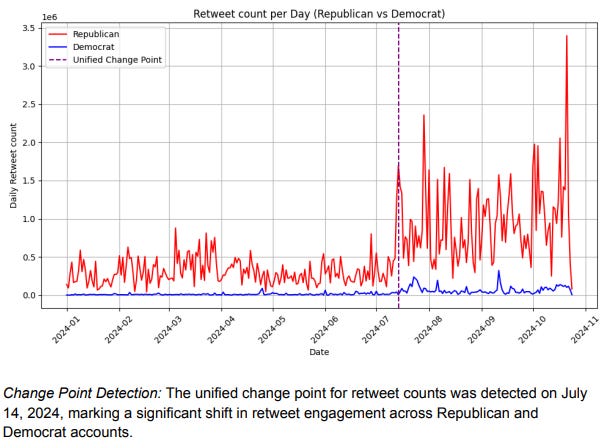
Before Elon Musk bought Twitter, many centrist or right wing commentators loved to discuss how “Twitter Is Not Real Life,” since the majority of commentary on the website only represented the minority of people who most actively used the website. This idea was true before Elon bought the website, but today it’s far more true than ever. At least before 2022, the number of bots or foreign actors was limited to how many people you could reasonably hire at a “troll farm.”
Today, there’s a growing body of evidence showing that a huge percentage of political commentary on Twitter doesn’t just come from a relatively small number of people, but also a large number of AI chatbots—potentially between 1/3 and 2/3rds of all accounts! When combined with new research that suggests that right-wing content has been algorithmically promoted over left-wing content on Twitter since Elon Musk endorsed Trump, it’s no exaggeration to say that not only is Twitter not real life, Twitter is not even real humans.
The reason I emphasize this research is that journalists, politicians, and regular users of social media alike are not immune from the cognitive bias of believing that the loudest voices on websites like Twitter reflect what most regular people believe. This includes Republican politicians, who may have been influenced to increase their spending on anti-trans ads due to the huge quantities of anti-trans rhetoric on Twitter. But it also includes Democratic politicians and journalists from traditional media outlets, who may be misled on what the electorate believes by the abundance of transphobic rhetoric on Twitter.
Interlude: A note from the author on cognitive bias.
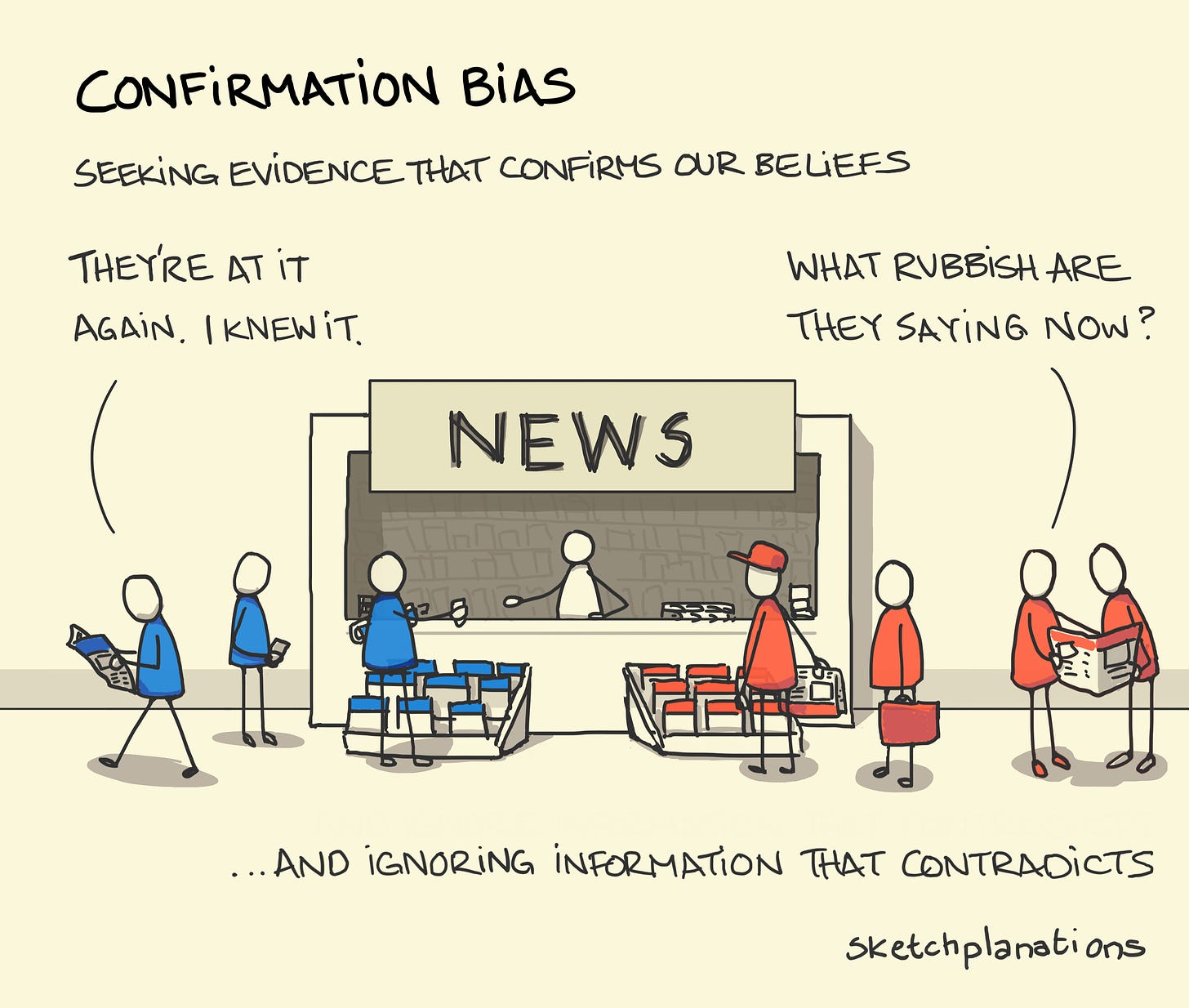
One important issue every scientist who works with data in today’s age has to acknowledge and consider when they analyze data is the fact that personal bias plays a large role in how we interpret data. For an issue like a presidential election, which involves over 150 million people, the amount of data is truly immense, especially when you account for the billions of dollars spent on campaigns and polling that collect data. You can reach almost any conclusion you would like to if you sift through enough data to find an outlier that proves your position.
In science, a great deal of effort is taken to reduce the impact of personal biases, such as through robust experimentation, transparency of data, and peer-reviews. In politics, politicians and pundits rarely use any of these methods, or sometimes don’t conduct any research at all, before making broad proclamations about “what the data says.”
The best way to prevent confirmation biases from impacting research is to make sure you consider all the data you have available before making strong claims, including data that does not agree with your personal beliefs or desired conclusion. Even data journalism like this article can succumb to the same biases if the data that is examined is cherry-picked.
While having personal biases is unavoidable, their impacts can be mitigated by intentionally taking an honest and broad approach towards evaluating the data. I hope to integrate this kind of rigorous methodology in my analysis of data as well, which is why I will evaluate data that have some people have used to argue that trans rights was a decisive factor in the 2024 election. Analyzing all data that supports or opposes my hypothesis is the best way to find where the truth lies.
8. Few voters have significantly changed their beliefs on LGBT rights since 2020, despite the “vibes” on Twitter.
As more and more people move to BlueSky, which has much more robust moderation tools, the reality-distortion effect of Twitter is likely to wane over time. But in the meantime, we should all reconsider the accuracy of our beliefs that overt transphobic, racist, and sexist rhetoric and policies are broadly popular.
The polling data show that the loudest opinions on Elon’s Twitter are often fringe minority positions, which have been systemically elevated by rampant AI chatbots and algorithmic interference from the Twitter’s owner. While the “vibes” of issues like LGBT rights or DEI policies have shifted since 2020 because of the interference, polling data indicates that the general population has hardly budged.
For example, one of the most common talking points on conservative Twitter besides transphobia is opposition to corporate DEI policies, which might make some politicians or companies think these policies are broadly unpopular. However, polling shows support for DEI policies has only fallen four points to 52% since 2023, and only 21% of Americans believing that DEI is actually “a bad thing”—not even a majority of Republican voters! Likewise, support for gay marriage only fell two points since 2022 to 69% (still higher than in 2020), with the losses mostly concentrated among Republicans.
Polling on trans rights has remained fairly consistent on important topics such as anti-discrimination laws and hate speech laws. While support for trans people to participate in sports or use the bathroom of their gender identity has fallen 4-8 points, none of these issues flipped from a majority opinion to a minority opinion. There was hardly a monumental shift in public opinion on any trans rights issue, as reading Twitter replies might have you believe.
The polling data here tells us is that the negative impact trans rights had on Democrats in 2024 should not have been much different than it was in 2020, when Democrats won—especially in the context that voters do not see these issues as important for their vote.
9. Trump’s policies that oppose LGBT rights are more unpopular than Kamala Harris’s policies in support of them.
Many who argue that Democrats’ support for trans rights cost Kamala Harris the election rely on cherry-picked questions from polls of voters about trans rights. While it’s true that majorities oppose trans people in sports or bathrooms, majorities also oppose the removal of anti-discrimination protections and the banning of trans people from the military, both of which are set to be high priorities for the incoming Trump administration.
Other extreme ideas suggested by the GOP and the MAGA movement, such as the “eradication of transgenderism,” would likely poll even worse among the general public. Taken together, the public’s views on trans rights suggests the public has mixed feelings on some aspects trans rights, but overall supports the rights of trans people to live their lives free of discrimination and hatred.
Gay marriage used to be broadly unpopular among even Democrats and liberals, culminating in George Bush winning the 2004 election after campaigning on a constitutional ban on gay marriage. Thanks to years of advocacy and compassionate education from advocates, gay marriage steadily gained popularity and support from mainstream Democrats, culminating in Obergefell. As noted earlier, gay marriage is supported by around 69% of Americans today, despite years of anti-LGBT propaganda from the conservative right.
Overall, the public polling tell us a few things:
A minority of Americans (25-30%) will probably never support any LGBT rights, largely due to religious reasons.
A significant majority of Americans (60-70%) are open to supporting LGBT rights, given enough time, education, and compassion. This includes most Democrats and Independents.
We already know that the most vocal hatred and opposition to trans rights has always originated from people in group 1, and Democrats have no reason to try to win their votes—the vast majority are Evangelical Christians and other elements of the GOP base. Democrats only need to win the voters in group 2 in order to win, who may have some skepticism on areas of trans rights they have been misinformed on, but are not necessarily hateful or bigoted people.
So what should Democrats do? Whatever the qualms of the LGBT community, anyone will acknowledge that it’s not always easy for a politician to support unpopular positions, even when they are morally correct. Does it make sense for Democrats to try to support some trans rights (like anti-discrimination laws and trans people in the military) while opposing others (like trans people in sports or bathrooms)? In an upcoming companion opinion column, I will explain why this kind of entanglement of positions does not make sense either, and suggest other ways Democrats can improve their political standing in relation to support for LGBT rights.
10. Many Democrats made the same exact argument for dropping support of some abortion rights after 2004. History proved them wrong.
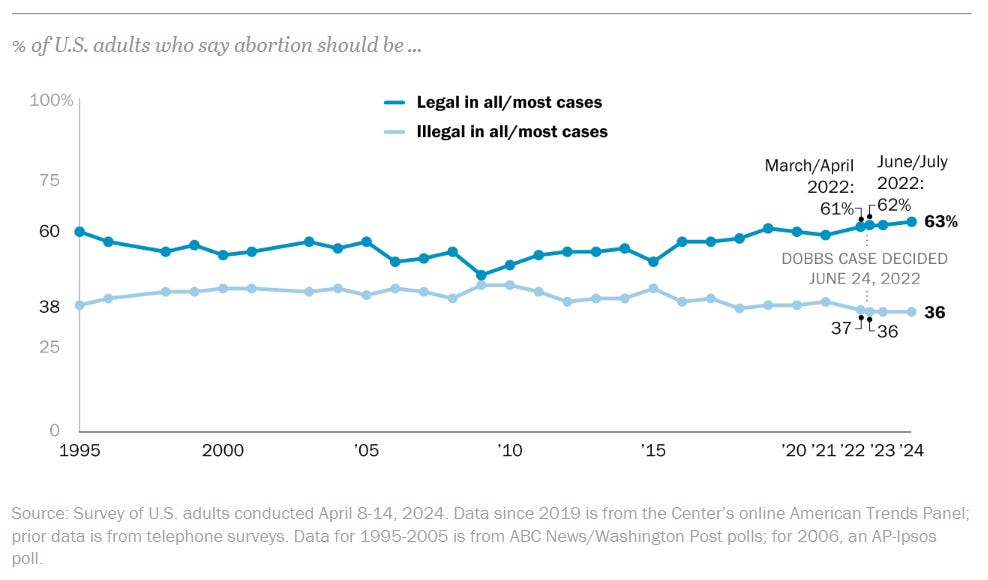
Many Democrats suggested that the party should de-emphasize abortion rights after the party lost the 2004 election. They suggested that while the party should remain generally supportive of abortion rights, they should also adopt some anti-abortion policies that were considered “popular” such as parental notifications when teenagers receive abortions. These arguments are almost a carbon copy of the arguments being made to backslide on trans rights today—just replace “parental notification” with “trans people in sports.”
Any suggestion to cede any issue on abortion to the GOP today would be unthinkable, even among moderate Democrats, as history has proven to us that the GOP is holds far more extreme positions on abortion than Democrats ever have. Indeed, Obama won in the largest landslide of this century in 2008 while campaigning on codifying Roe v. Wade, rather than de-emphasizing the issue or supporting parental notifications like many had suggested.
Intriguingly, despite Democrats becoming more vocal on the issue, the general public’s beliefs general on abortion rights has barely shifted. Pew Research polling has consistently shown since 1995 that roughly 60% of Americans have opposed repealing Roe v. Wade. The most significant factor that changed since 2004 is the ability of Democrats to effectively campaign on their support of abortion rights, a process that started years before the Dobbs ruling solidified their ability to make it a top issue in campaigns.
We learned just how effective pro-choice messaging can be after the party’s overperformance in the 2022 midterm elections. While Dobbs certainly bolstered the party’s message as abortion became illegal in many states, Democrats could not have credibly capitalized on the backlash to Dobbs to the same extent had they further ceded the issue to the GOP after 2004.
Similarly, in order to capitalize on backlash to discriminatory anti-trans policies, Democrats must maintain their stance in support of LGBT rights, rather than capitulating to right wing rhetoric on the issue.
11. Watching politicians persecute trans people will energize the Democratic base and persuade people to oppose anti-trans policies, so long as Democrats continue to function as viable opposition to those policies.
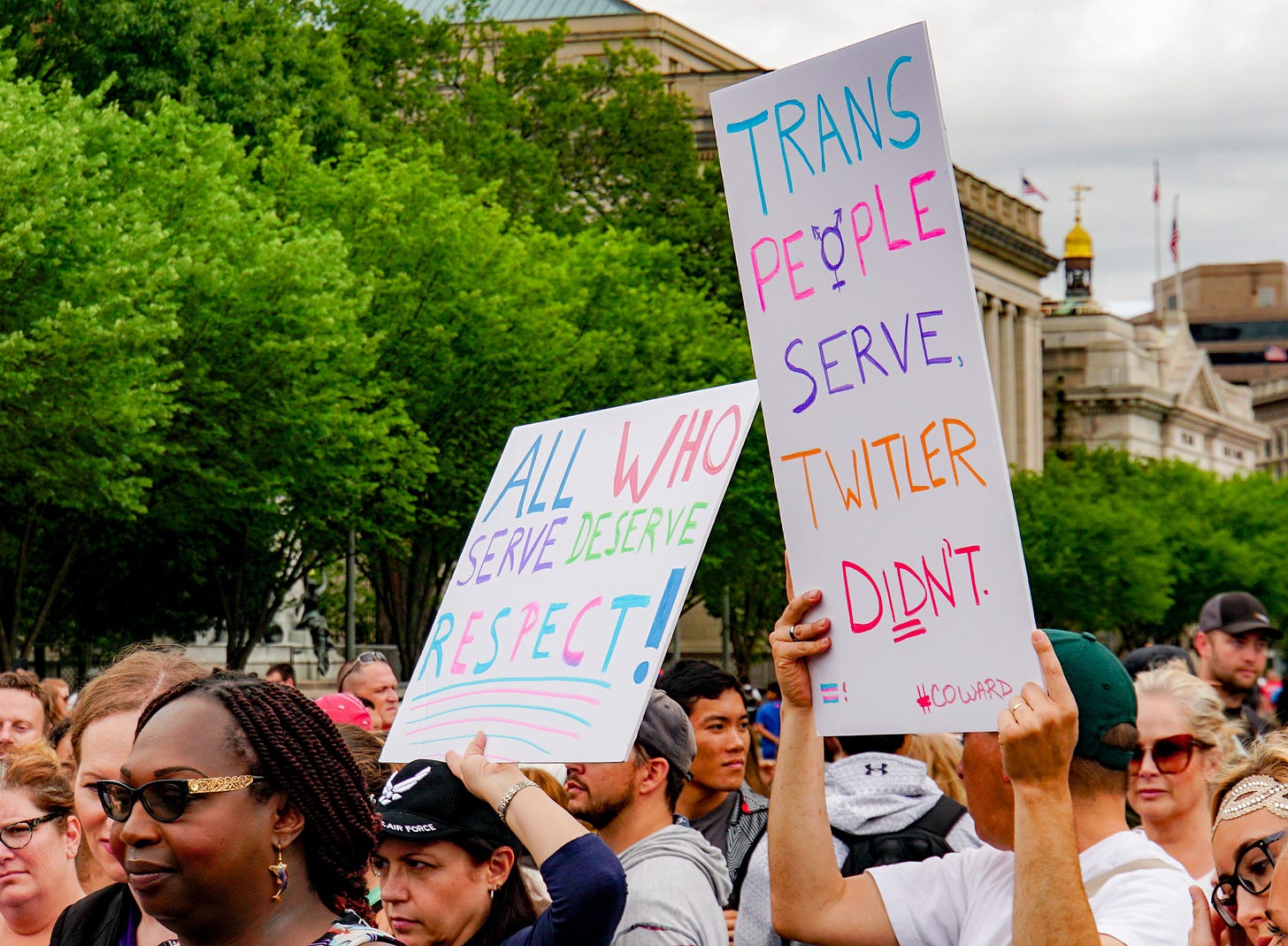
Although it hardly feels great to discuss about any attack on human rights as “energizing,” the impact of open political persecution of a minority by the federal government can’t be overstated. In Trump’s first term, his transgender military ban led to widespread outcry from Democrats not just in Congress, but at home across the country. These actions among others actually bolstered public support of trans people in the military, and also cemented the idea among many Democrats that the party was committed to preventing the targeting of marginalized groups by the Trump’s administration. It’s one thing to support a discriminatory or harmful policy on paper, but it’s another to continue to support the same policy when it’s enacted and being enforced.
In 2018 and 2020, Democrats successfully campaigned on reversing many Trump administration anti-LGBT policies such as the trans military ban and the removal of LGBT discrimination protections in the federal government. However, this success was only possible due to unified vocal opposition to these policies in favor of supporting LGBT people, a reputation that could easily be damaged by even a small number of Democrats turning against LGBT rights.
Some of Trump’s first actions after inauguration will include deeply unpopular policies like the revival of the trans military ban, the removal of federal anti-discrimination protections for LGBT people, and attacks on trans healthcare and the ACA. In order to fully capitalize on the backlash to these policies and reactivate “The Resistance,” Democrats would be wise to maintain a firm stance against all forms of anti-LGBT discrimination, otherwise it will be difficult for voters to credibly believe the party is a viable way to stop these policies. For example, the vast majority of Democrats on social media have expressed disgust at Rep. Nancy Mace’s transphobic attacks and hatred towards Rep. Sarah McBride. Vocal support for Rep. McBride by members of Congress would further energize the base to continue organizing to defeat the GOP in 2026 and beyond.
12. Democrats have won the messaging war on trans rights before. In 2016, bathroom bills targeting trans people were considered so politically toxic that even Donald Trump said he opposed them.
While it might sound like a foreign planet to some of us today, the Republican opposition to trans rights had a very rocky start. North Carolina passed a bathroom ban in 2016, which resulted in widespread outcry, corporate boycotts, and condemnation from Democratic politicians. As the boycott started to hurt the state economy, North Carolina repealed the bathroom ban, and the whole debacle helped Democratic Governor Roy Cooper win his election in 2016 in a state Hillary Clinton lost.
So what has changed since 2016? Public opinion hardly shifted since 2016, as bathroom bans had majority support in polls back then as well. The main difference was that Democrats did not feel afraid to strongly oppose the policy in order to energize supporters and galvanize public opposition to the measure. Even Donald Trump opposed the measure in 2016, “There have been very few complaints the way it is. People go. They use the bathroom that they feel is appropriate.”
So why are Democrats more afraid to vocally oppose a bathroom ban in 2024 than Donald Trump was in 2016? The shift seems to have little to do with how Americans actually feel about the issue, but rather the narrative that has formed in the media that Democrats lost the election due to trans rights. But recent history should inform us that Democrats can win the messaging war in favor of trans rights, while making electoral gains in the process.
13. The most passionately anti-LGBT voters are committed partisan Republicans, not persuadable voters.
Evangelical Christians have been the primary voting bloc that drives GOP opposition LGBT rights. Although some non-Evangelicals also oppose trans rights, the moral panic against trans rights originated from the deeply Christian parts of the party who believe that the Bible does not allow for trans people to exist, the same way they believe that the Bible does not allow for gay sex or gay marriage to exist. Trying to appeal to these voters by changing positions is highly unlikely to work, since Evangelical Christians are the most committed Republican voters in the country.
There’s a reason why the GOP continues to support policies such as restrictions to abortions and opposes others, like universal background checks for weapon purchases, despite the fact these positions are only supported by between 20 and 30% of voters. Even though the large majority of voters don’t support their positions, they still gain far more electorally by supporting the minority position on these issues.
The simple truth is that Evangelical Christians who oppose abortion and gun owners who oppose gun control are far more passionate about these issues than the average swing voter who may have opposite opinions on those issues. The standard the media has been taking that Democrats are “out of line with the majority of voters” on trans rights appears to be a standard that only Democrats are held to, especially since the GOP tends to hold far more unpopular policy positions on the whole.
14. The data used to support the argument that trans rights negatively impacted Democrats in the election is weak at best.
One of the biggest reasons why many Democrats feel that trans rights was decisive was the fact that Republicans spent over $200 million on anti-trans attack ads before the election, and the fact that some focus groups showed that some of the attack ads were effective in swaying swing voters. However, this argument makes quite a few assumptions about both the GOP and their donors, as well as the general effectiveness of TV ads as a persuasion tool.
First of all, the evidence that Republicans chose to air anti-trans attack ads specifically because they were the most effective ads they could have run is rather sparse. Most polls showed that voters were most concerned on topics like the economy and immigration, which Trump already had an advantage on. There are many other factors that may have played into why the GOP spent so much money specifically on anti-trans attack ads.
For example, Republicans may have hoped to energize the GOP base, or they might have relied on the preferences of large donors who fund the ads. We know that the politics of Elon Musk, who routinely harshly attacks prominent transgender voices such as Vivian Jenna Wilson, are highly motivated by an opposition to trans rights. He stated that he partially was motivated to buy Twitter by restrictions placed on accounts that posted transphobic content, like the Babylon Bee or Libs of Tik Tok.
One other potential reason for the focus on trans rights could have been to persuade Democratic politicians to take a more conservative position on trans rights, so that they could get enough votes in the Senate to pass legislation such as bathroom bans or the codification of “biological sex.” This reason is particularly compelling, since the ads seem to have potentially swayed the minds of at least a few Democrats in Congress.
Focus group data from anti-trans ads might have reinforced the decision to invest in these ads, but that doesn’t mean that it was the most efficient possible use of that money. If Democrats had a more conservative position on trans rights, the GOP still would have spent $200 million on TV ads to persuade swing voters, which they could have used to focus on more broadly salient topics such as inflation or immigration.
These focus groups would also miss the impact these ads could have had on LGBT turnout against Trump, since many LGBT people in these states were swarmed by ads that attacked them directly for weeks in the come up to the election. Meanwhile, ads that focused on less divisive topics like the economy could have actually been more effective at winning over swing voters, since that was the most important issue for voters across the country.
Summary: What does this all mean?
What does the pure data say, ignoring all assumptions made by the author?
For this section, we should assume that the worst case scenario for advocates for trans people such as myself is true. Here are the assumptions I made throughout this article that would be incorrect, under this scenario:
The 4% of voters who indicated that opposition to trans rights was their most important issue included a significant number (more than 20% of the 4%) of swing voters and independents, rather than hardcore Republicans.
Secondary assumption: At least some of these swing voters would have been convinced if Democrats changed their stance on trans rights.
Focusing on trans rights was actually the most efficient way for the GOP to spend $215 million on TV ads.
In this worst-case scenario for my assumptions, the impact of trans rights on the election would still just be roughly neutral on the overall results. After all, the data shows 5% of Americans considered support for LGBT rights the most important factor in their vote (and 86% of the 8% of voters who were LGBT did vote for Kamala Harris); there is no getting around the fact that Democrats opposing trans rights would also result in lower turnout from LGBT supporters. This may have resulted in lower turnout for Republicans as well, since they would no longer be able to energize their base, and overall cancel out the impact. Even if some anti-trans voters could have been convinced to vote for a Democrat who opposed trans rights, this swing effect would merely cancel out the fact that more people voted with supporting LGBT rights as their top issue.
What if the author’s assumptions are correct?
Let’s consider the alternative scenario, where the assumptions I made throughout this article are true. This reality may very well be false, considering that my assumptions are tainted by some amount of unavoidable bias. However, it’s still worth considering what the best-case scenario would look like, as the truth likely lies somewhere in between the best-case and worst-case scenarios. In this scenario:
The 4% of voters who indicated that opposition to trans rights was their most important issue consisted mostly of hardcore Republicans who never would have voted for Democrats.
Secondary assumption: The vast majority of these voters could not have been convinced to vote for a Democrat, but they may have been energized to vote by anti-trans ads
Focusing on trans rights was a less efficient use of $215 million of TV ads than focusing on the economy or other more salient issues.
In this scenario, supporting trans rights was a net positive for Democrats on both fronts. Since the number of people who said support for LGBT rights was their top issue than the number said opposition to trans rights was their top issue, Kamala’s refusal to back down to anti-trans attack ads would have had a slightly positive impact on her chances overall—around 1%. In addition, under this scenario
The GQR memo provided earlier also agrees that LGBT voters delivered huge margins to Harris overall, and agreed with my previous analysis that LGBT voters delivered Democrats wins in the Senate in Arizona, Michigan, Nevada, and Wisconsin (while keeping Pennsylvania highly competitive). It’s not hard to imagine how disastrous a 57-43 GOP Senate would have been for the Democratic party’s political prospects.
Analyzing both scenarios together
Examining the gap between the best and worst case scenarios informs us on the significance of trans rights on the election. Since the scenarios only differ by about one point in the overall margin, the amount of coverage and attention that has focused on trans rights has likely been disproportionate to its actual impact. implies that regardless of which of the assumptions of this article are true, journalists and politicians should avoid overemphasizing the importance of trans rights on the overall outcome, since it may draw unnecessary attention away from issues that had a much more prominent impact on the outcome.
The fact that several Democratic candidates for Senate won in states that Kamala Harris lost despite taking the same position on LGBT rights also suggests that other issues like the economy and disapproval of Joe Biden’s administration were more decisive than trans rights were on the election. Democrats would have an easier time adapting their strategy to have a stronger message on the economy, for example by more vocally supporting popular Democratic policy positions such as increasing the minimum wage, healthcare reform, or mandated sick leave.
Final Takeaways
Journalists and Democratic politicians should strongly refute the idea that trans rights hurt Democrats by pointing out that the data suggests they may actually have actually benefited during this election from supporting LGBT rights, since LGBT voters swung 22 points towards Democrats since 2020 and delivered Democrats important wins in Senate races in states Kamala Harris lost. Elected members of Congress should abide by their campaign promises that earned them LGBT voters by continuing to oppose laws such as bathroom bans that could expose trans people to violence across the country.
One of the factors driving the closeness of almost every election in the 21st century is the fact that many issues result in roughly an equivalent number of people on each side being energized to vote for their party. Trans rights is no exception to these trends, and the data shows that Democrats can find much more effective tools to win future elections than backsliding on trans rights.
About the author
I’m happy to answer any respectful questions about my background from journalists or public figures in my Substack inbox or email at madycast.com@gmail.com.




